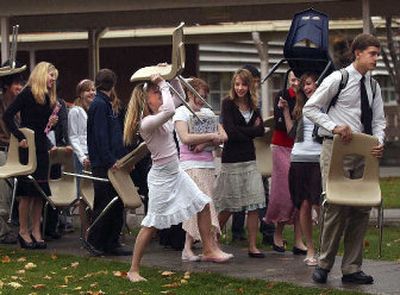Lessons in education

For private schools, “No Child Left Behind” is a goal, not a federal mandate. Private schools set their own rules and choose their own curriculum. Some schools graduate several hundred students each year, some less than a dozen. Some teach religious beliefs, some prepare students for college.
Many parents pay university-rate tuitions but are willing to do so because these schools meet their expectations for their children’s education.
Their disciplined environment and core curriculum make them some of the most effective schools in the country.
There are eight private high schools in Spokane County and many mistaken beliefs about them. All are religious-based except for St. George’s School.
“That’s one of the biggest misconceptions about St. George’s, because of the “saint” most people think we’re a Catholic school,” said communications associate John Carter.
Carter said that St. George’s started out as an Episcopal school. After a short time, it became nonsectarian, but the school kept its name. It’s the only independent K-12 school in Eastern Washington.
“We pull from 31 different ZIP codes in Spokane and surrounding areas. Our students come from across the metro area: 2 percent from Idaho, 12 percent from the Spokane Valley, 47 percent from the North Side, 38 percent from the South Hill, and 2 percent from central Spokane. Bus service provided by the school covers 675 square miles on six different bus routes,” said Carter.
Gonzaga Prep president Al Falkner said that it’s a misconception that only rich kids can afford to attend Prep. “Most people would be very surprised to learn that 24 percent of our students would qualify for free or reduced lunches,” said Falkner. Gonzaga Prep’s “fair share” program makes it possible for students from a variety of financial backgrounds to go to school there.
They may also be surprised that while Prep is the only Jesuit high school in the Inland Northwest, more than a quarter of its students aren’t Catholic.
And not all Catholic schools are the same. “One thing that sets us apart is that we are traditional Catholic,” said Sister Mary Loretta, school registrar at St. Michael’s Academy. “We are not part of a diocese. We have not gone along with the changes of Vatican II. We have the Latin Mass and teach from the Baltimore Catechism.”
Many people don’t realize that St. Michael’s has high school students from all over the country boarding on campus, as does Upper Columbia Academy, a Seventh-day Adventists school in Spangle, that boards 200 of its 268 students.
“People see the campus and think we’re a small college rather than a high school,” said UCA Principal Jeff Bovee. Students don’t need to be Seventh-day Adventist to attend, but they need to participate in Bible study, said Bovee.
Spokane Junior Academy, also a Seventh-day Adventist school, offers ninth and 10th grade. Principal Donald Bryan said that one of the biggest misconceptions about the school is that they’re cultists. “We’re very much a part of the community. Some people look at the location (1505 W. Cleveland Ave.) and the outside of the building and make judgments. They think that the neighborhood isn’t safe, but that should change when we move our campus,” said Bryan.
In fall 2006, Spokane Junior Academy will move to a 39-acre parcel at 1115 N. Government Way. Once they move they will offer classes for grades 9 through 12.
“One of the biggest misconceptions is that private schools, in particular the Christian schools, have an inferior academic program,” said Wes Evans, administrator of Valley Christian School.
Evans said that in the last few years they have had students move on to prestigious academic programs including the U.S. Military Academy and the U.S. Naval Academy. Two students in this year’s senior class of 26 have performed well enough on their Preliminary Scholastic Aptitude Test to be named a National Merit semifinalist and a National Merit commended student.
Talk about tough academic classes, at the Oaks Classical Christian Academy, the newest private school in Spokane, elementary students are taught Latin. Principal Bruce Williams said that people may not know what a “classical” education is.
The Oaks is revitalizing trivium education. Based in Latin, it consists of three parts: grammar (facts and rules), dialectic (logic) and rhetoric (expressing thoughts in verbal and written form).
The school is also based on Christian beliefs and students attend Bible classes. Williams said he’s very upfront with parents about this. “They’re buying a product. They need to know what they’re getting,” said Williams.